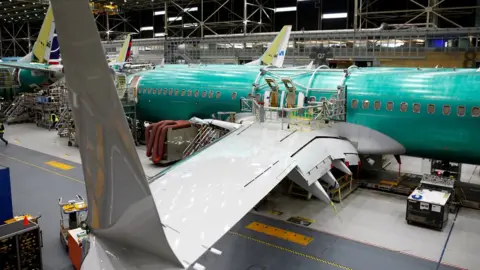Boeing takes $5bn hit over grounding of 737 Max
 Reuters
ReutersBoeing is taking a $4.9bn hit to cover costs related to the global grounding of its 737 Max aircraft.
The charge is set to wipe out profits when the world's biggest planemaker posts quarterly results next week.
In a statement, Boeing also said its "best estimate at this time" is that the aircraft will return to service in the last three months of this year.
A 737 Max crash in Indonesia in October, and another in Ethiopia in March, killed 346 people in total.
Boeing is facing one of the worst crises in its history after regulators banned its best-selling aircraft from flying after the disasters.
Crash investigators have concentrated their efforts on the aircraft's control system and Boeing has been working with regulators to roll out a software upgrade.
The manufacturer, facing intense scrutiny over the regulatory clearance for the aircraft to fly, has cut the monthly production rate from 52 to 42 as airlines hold off purchases.
Most of the $4.9bn charge will be used to compensate Boeing's customers for schedule disruptions and delays in aircraft deliveries.
On Friday, Boeing's share price jumped 4% at the start of trading, a sign that investors seem comfortable with the charge. Analysts knew that Boeing faced a heavy financial cost following the disasters and had been awaiting clarity.
In April, Boeing halted share buybacks, and said that the grounding of the 737 Max fleet had cost it an additional charge of at least $1bn so far.

Analysis:
Theo Leggett, BBC international business correspondent
$5bn, and very probably counting.
The money set aside by Boeing is meant to cover compensation for customers who either haven't received their aircraft, or can't use the ones they already have.
Airlines who are waiting for overdue deliveries are having to make alternative arrangements, by cancelling services, leasing aircraft from specialist companies, or by keeping older, less fuel-efficient models in service for longer. All three options come at a cost.
And for those who already had Max aircraft in service, there will be financing costs that still have to be paid, even when the planes themselves are not earning their keep. Not to mention the money that needs to be spent on maintaining them while they are on the ground.
All of this, ultimately, is likely to come back to Boeing. The $5bn figure assumes that the process of approving the Max to go back into service will begin in the autumn. But we have already seen that regulators seem determined to take a very tough line when it comes to ensuring the safety of the aircraft. The schedule could well slip again, and costs rise further.
Let's not forget either that lawsuits filed by relatives of accident victims are mounting up, and this charge does not take them into consideration at all. So the final bill for Boeing may well be a lot higher.

Boeing chairman and chief executive Dennis Muilenburg, said: "This is a defining moment for Boeing. Nothing is more important to us than the safety of the flight crews and passengers who fly on our airplanes.
"The Max grounding presents significant headwinds and the financial impact recognised this quarter reflects the current challenges and helps to address future financial risks."
Cancelled flights
Boeing said it continues to work with aviation authorities to get the 737 Max back into the air, which it hopes will be in the fourth quarter of 2019.
But the statement added: "This assumption reflects the company's best estimate at this time, but actual timing of return to service could differ from this estimate."
Boeing also warned that if this timetable slips, and its anticipated resumption of deliveries to customers is delayed, that this "could result in additional financial impact".
However, in a speech on Thursday, the US transportation secretary appeared less certain that the aircraft would be cleared to fly again this year.
Elaine L Chao said the Federal Aviation Administration, "is following a thorough process, rather than a prescribed timeline... the FAA will lift the aircraft's prohibition order when it is deemed safe to do so." She was not referring directly to Boeing's statement.
On Thursday, Southwest Airlines, the biggest user of the 737 Max, joined its US rivals in cancelling more flights until early November.
The move also prompted the low-cost carrier to freeze new pilot hiring.
